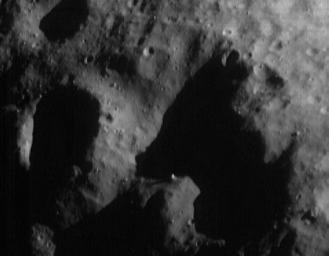
|
Light and Shadow
- Click the image above for a larger view
- Full-Res JPEG (477 x 372) (19.4 kB)
- Full-Res TIFF (477 x 372) (153.3 kB)
Caption:
Eros' irregular shape creates interesting and beautiful scenes where the Sun shines obliquely on the surface. In the absence of an atmosphere, and hence no secondary illumination reflecting from atmospheric molecules, shade appears nearly as black as space.
This image, taken from the NEAR Shoemaker spacecraft on May 2, 2000, from an orbital altitude of 50 kilometers (31 miles), shows one of the more telling and yet comical combinations of light and shadow. The entire scene is about 1.8 kilometers (1.1 miles) across. High spots near the edges of shadows, like the 35-meter (115-foot) diameter boulder just below the center of the frame, seem almost to "float" above the surface. With a little imagination, the shadow dominating the right side of the frame could be seen as a small, long-eared terrier bending over to sniff his dinner!
Background Info:
Built and managed by The Johns Hopkins University Applied Physics Laboratory, Laurel, Maryland, NEAR was the first spacecraft launched in NASA's Discovery Program of low-cost, small-scale planetary missions. See the NEAR web page at http://near.jhuapl.edu/ for more details.
Cataloging Keywords:
| Name | Value | Additional Values |
|---|---|---|
| Target | 433 Eros | |
| System | Near Earth Objects | |
| Target Type | Asteroid | |
| Mission | NEAR Shoemaker | |
| Instrument Host | NEAR Shoemaker | |
| Host Type | Orbiter | |
| Instrument | Multi-Spectral Imager (MSI) | |
| Detector | ||
| Extra Keywords | Atmosphere, Grayscale, Shadow | |
| Acquisition Date | ||
| Release Date | 2000-06-10 | |
| Date in Caption | 2000-05-02 | |
| Image Credit | NASA/JPL/JHUAPL | |
| Source | photojournal.jpl.nasa.gov/catalog/PIA02907 | |
| Identifier | PIA02907 | |
